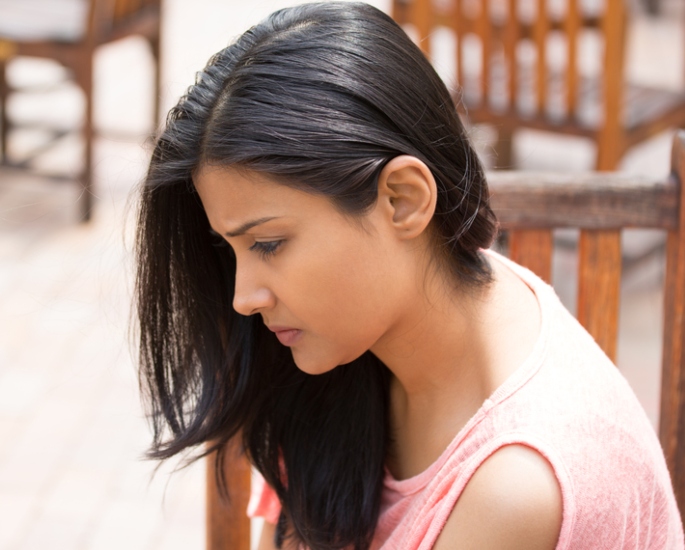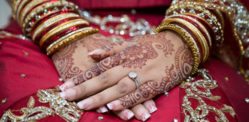"I don't have the help of two incomes any more."
In Desi communities, divorce remains a sensitive issue. For divorced British Asian women, numerous challenges can arise, shaped by family and socio-cultural ideals, expectations and judgements.
Divorce has become more common for British South Asians, yet an undercurrent unease remains. The ongoing stigma and shame, in part, manifests from the idealisation of marriage and traditional family forms.
From the moment the decision to divorce is taken, and even post-divorce, women can face emotional, socio-cultural and financial tensions and challenges.
Indeed, women from Pakistani, Indian and Bangladeshi backgrounds in Britain can still find themselves confronting deeply rooted cultural biases, gendered expectations, and systemic barriers post-divorce.
This article explores the struggles divorced British Asian women face. It sheds light on the impact of socio-cultural, family and financial pressures on their journey toward independence and self-empowerment.
The Challenges Begin Before the Divorce is Official

For divorced British South Asian women, the challenges and pressures manifest before a divorce has taken place.
From both a cultural and religious perspective within South Asian cultures, heterosexual marriage is seen as a lifelong commitment, and there is pressure on the couple to work out any issues.
Marriage and divorce are not just about the couple. Within Desi families, marriage can also be the merging of two families. When divorce occurs, wider family feelings, views, and concerns can impact divorce decisions or result in tension.
Cultural conditioning can pressure South Asians to stay in unhealthy marriages, and there can be a silent expectation to tolerate unhappiness, especially from older generations.
Razia, a 45-year-old British Pakistani mother of two, revealed:
“Times have changed, but some people still whisper and judge, especially for Asian women.
“Marriage is still considered sacred, and older generations can judge. When I first divorced for years, my Nani would say in Urdu, ‘should have sucked it up and carried on’. That’s what I did.
“For my Nani, I gave up too easily. She couldn’t understand that the divorce was best for everyone involved, especially my children.
“If I had stayed with my husband, the toxicity of our relationship would have damaged them.
“My family and ex-husbands were and are close, so that was an issue too, and added pressure.”
“My Ammi was the one who encouraged me to ignore worrying about how it would impact everyone else. She told me to focus on me and the children and what we needed.”
Judgement from her maternal grandmother and her mother’s support impacted her emotionally.
Family and emotional support can be invaluable during and after the divorce process.
Dealing with Feelings of Shame, Failure & Embarrassment

Once the divorce occurs, British South Asian women often face further challenges, such as dealing with feelings of shame, failure and embarrassment.
Such feelings can manifest from being judged by family, friends, and others in the community. On the other hand, they can emerge from an internalisation of socio-cultural norms and ideals that idealise marriage.
Negative feelings can, in turn, detrimentally impact mental health and wellbeing, leading to stress, depression and anxiety.
Razia stated: “Once the word divorce left my mouth and I knew I was really doing it, I felt like a failure. A failure at marriage, a failure in giving my children a family.
“My emotions were a roller-coaster. My Ammi and her help helped me stabilise and focus on my children and what I needed to do.
“It hurt looking at my Nani sometimes because I knew what she was thinking; that had me crying a lot.
“We were close, and her judgment was a never-ending stab. It made me feel more like a failure.”
Thirty-four-year-old British Bengali Sara* revealed to DESIblitz:
“Divorce, with or without kids, can be a small or big trauma. Dreams and hopes are shattered.
“We have to deal with real life and getting on with things and taking care of our mental health. But the mental health part we can forget.
“I did. As I tried to understand my new divorced life and deal with my family, I forgot to take care of myself for a long time.
“I was in a fog for ages, and even though my family had my back, I still struggled with having failed.
“Took me a long time to realise I hadn’t failed, it takes guts to say enough and end things.”
Cultural mores and idealisations of marriage and stigmatisation of divorce can lead to a silent struggle for British Asian women. This can take a toll on their mental health and exacerbate the already difficult process of separation and starting a new life.
Pressure to Move back into the Family Home

Some divorced British Asian women can face expectations or pressure from family to move back and stay within the parental home.
Desi women, particularly those in more traditional families, might be encouraged to live with their parents, often rooted in cultural norms, familial expectations, and practical considerations.
For women, staying in the parental home is often associated with safeguarding their “honour”, reflecting traditional views on modesty and propriety.
It is also linked to ideas around the need for male protection and family and financial support.
Thirty-five-year-old British Bengali Alina* has found herself with the challenge of continuously justifying why she does not want to return to the parental home:
“For a bit after my marriage ended, me and my son stayed with my parents and siblings.
“But once I’d sorted myself out, under six months, I rented my own home. It’s near them; they see me and my son regularly, almost daily.
“Still, from the moment I told them I was looking for a place, crap hit the fan. They didn’t get it.”
“I love my parents and siblings. They helped and still help so much. But being home, I felt like I was regressing to being a child in their eyes.
“I didn’t like losing my independence and not being in my own space.
“Now, having my own home and space, I feel calmer, grounded. My every action with my son doesn’t get feedback from my family.
“I make the decisions and am responsible. Yes, it’s not easy, especially financially, but it’s much better like this.”
In turn, 30-year-old Meeta*, a British Indian Gujarati, disclosed her struggles:
“When I divorced, there were no kids, and even though I had my home, my dad thought I’d rent out or sell and move back in with them.
“Me living alone was a big deal. I almost caved and moved in but then didn’t.
“I have a good job and can afford to sustain myself, but for my dad, I was still a girl and now unmarried. It caused arguments for a long time.”
Navigating Co-Parenting and Single Parenthood

British Asian women who are divorced can also face the challenge of navigating the new terrain of single parenthood and co-parenting with an ex-partner.
Indeed, Alina revealed: “My ex and family did not get on, so after the divorce, managing co-parenting was hard. He would be difficult just to get my family’s back up.
“He only stopped when I told him hard how much it would impact our son, and I wouldn’t stand for it.
“My family, my mum, would try to tell me to do things her way with my son after I divorced. It was weird she didn’t do it like that before the divorce.
“She was trying to help, but it was too much. One of the reasons I had to move out and get my own home.
“Financially, it was and is difficult, even with the ex helping with our son.”
“I don’t have the help of two incomes any more; it changed things drastically.
“In this country, the last government and this one have made it so hard for single people and single parents. And with the cost of living, if my family didn’t help with childcare, I’d be screwed.
“It can also be isolating being a single parent. Me and the ex had some of the same friends. I lost a few.
“And those people who were judging or pitying even unintentionally me being divorced, I didn’t want around my son.”
Deciding to Remarry or Not to Remarry

For divorced South Asian women, the issue of remarriage can be complex and fraught with cultural, social, and personal challenges. Thus leading to stress, emotional difficulties and family tension.
Some women may face expectations to remarry, while others face judgment for remarrying or contemplating doing so.
Thirty-three-year-old British Bengali Taybah* stated:
“I knew my family would be like marry again, I knew it. It was one of the main reasons I hesitated to divorce.
“I also wanted a baby, and starting all over again sounded like a nightmare.”
“I was right. Once I got the Islamic divorce, one brother mentioned how looking for a new rishta was a good way to move on.
“He kept going on. I wanted to hit him.
“The only good thing was I didn’t live with him, but my parents and they were a surprising buffer. Told the rest of the family to ‘keep mouths shut’.”
Neelam*, a 32-year-old British Pakistani, had a different experience:
“My family were super supportive when I divorced and after. They encouraged me to live and gave me and my daughter extra love.
“When my daughter hit four, I felt ready to consider remarrying, and that’s where it got sticky with my mum.
“Mum thought me having a daughter meant remarriage wasn’t needed; I had a kid. She also thought it was risky; I couldn’t know if he would be a pervert or fake to my daughter.
“My daughter’s well-being was and is always a top priority. I’d never marry anyone if I thought they wouldn’t accept her or she would be at risk.
“But I want more children, and I miss intimacy, and for me, those happen in marriage. I’m not rushing into anything, but I am using a matchmaker.”
Issues of remarriage can lead to tension; some divorced British Asian women are not ready, but family members can feel it should occur, as with Taybah.
In other instances, the desire to remarry can lead to disapproval and concern from family members, as seen with Neelam.
Brit-Asian Women Who are Working to Change Things

There are South Asian women across Britain trailblazing, taking their own experiences of stigma, divorce and single parenthood to support and advocate for others.
Determination to remove the stigma and isolating nature of divorce and single parenthood in Desi communities has led to the emergence of not-for-profit support groups and organisations.
Ritu Sharma, the founder of the non-profit Kaushalya UK, experienced the socio-cultural stigma and family judgment for divorcing and said:
“The biggest challenge that I personally faced was that there was no support whatsoever around me while I was going through a divorce, and so I had lots of struggles.
“My mental health being the biggest one, and having the responsibility of two young children, which was a bit too much for me at the time.
“I had no moral or emotional support at all. There was no friendly circle and nobody I could lean upon.”
Ritu’s divorce occurred several years ago, but the reality for many today is the same. Thus, she is determined to advocate, ‘speak out and challenge’, and work on the frontlines to provide support.
Family pressure continues to impact decisions made by Brit-Asian women when it comes to marriage and divorce.
Aruna Bansal established the Asian Single Parents Network (ASPN) CIC due to her experiences as a single parent. She told DESIblitz:
“The elder generation still think marriage is for life. Even now, many people feel pressured to stay within a marriage even if they are unhappy, and that can happen from just growing apart.
“Others want to leave due to domestic violence and other issues.
“I’ve spoken to many who won’t leave due to family, who have been told they will be disowned.”
“When some family centres, hubs and other organisations get Asian people, they usually get me to speak to them, as we have more experience from a cultural side of things.
“We understand the stigma and all they have to deal with in Asian cultures.
“One lady I spoke to earlier this year is unhappy, going through coercive control, and her child is impacted too.
“She won’t leave, can’t leave because her family will disown her.”
Aruna stressed the need for educational training to ensure culturally nuanced assistance is provided through services in all sectors.
Organisations like ASPN help create invaluable safe spaces for single parents, including divorced single parents, to gain support and comfort.
Similarly, organisations like Kaushalya UK give women a safe space to express themselves and explore their identities outside traditional Desi ideals and expectations.
The mentoring and educational training that Ritu and Aruna can provide to service providers is invaluable and much needed to ensure that support services are aware of cultural nuances.
Having British South Asian organisations and individuals visible, providing support services and undertaking advocacy work is vital.
It plays an essential role in working towards destigmatising divorce, single parenthood and going against traditional expectations and ideals.
Are Challenges Inevitable?

British Asian women can face significant multi-faceted challenges post-divorce due to gendered socio-cultural ideas and norms.
Divorce’s emotional and practical realities mean some challenges are inevitable, but not all. Moreover, it is possible to alter how women experience and are forced to deal with post-divorce challenges.
Some challenges are key consequences of socio-cultural norms and ideals specific to South Asian cultures, in addition to traditional and conservative gendered ideals and standards that lead to stigma, pressure and feelings of shame and guilt.
Yet other challenges materialise due to the framework of modern Britain, such as cost-of-living pressures, high childcare costs, and rental prices.
The support of family can also play an invaluable role for divorced British Asian women as they navigate challenges and a new life.
There is a need for structural change within the UK, such as changing policies that place significant pressure on single and divorced individuals and parents.
While divorce will always bring challenges, small or large, for British South Asian women, it doesn’t always mean a life marked by difficulties.
Moreover, the challenges tied to South Asian socio-cultural ideals and stigma can be dismantled.
Key to this dismantlement is open conversations, questioning and moving away from gendered expectations, and uplifting Desi women.
Such dismantlement, advocacy work, and uplifting are increasingly seen in the Voluntary and Community Sector (VCS).
In the VCS, South Asian women often lead the campaign for change and create support frameworks.
Indeed, this is why Ritu Sharma, through her work, writing, and engagement with the community, focuses on “challenging the norms, the status quo, the taboos and speaking about it all.”
Ritu stated: “Professionally and personally, I believe there needs to be an understanding that marriage and divorce are a part of life, but not the whole life.
“Culturally, we are very set in thinking still that if a person is married, they should stay in the marriage regardless of circumstances, abuse, or any of the factors that make it difficult for the couple to carry on.
“So we need an understanding, acceptance, and change of thought here culturally, that it’s ok for women to divorce and move away.
“It’s ok for a woman to decide to be on her own, that should be accepted.”
“That would come with education and understanding, and I suppose that would take a very, very long time for South Asian communities to accept.
“For now, in Britain, we are more culturally set compared to people back home. This is part of our identity; we hold on to the old values and patterns.”
Individuals such as Ritu Sharma and Aruna Bansal and their organisations need greater spotlighting within British Asian communities.
Their contributions and lives highlight that life continues beyond divorce for British Asian women and that challenges can be overcome.
The obstacles arising from traditional and gender-biased South Asian beliefs, ideals and expectations need ongoing scrutiny and deconstruction for British Asian women, divorced or not, to thrive.






























































